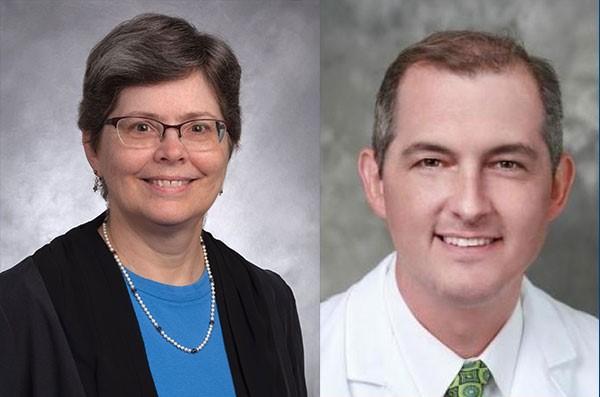
Professor of Pathology Laura Hale, MD, PhD, and Associate Professor of Surgery Joseph Turek, MD, PhD, were awarded a four-year $2.8 million R01 grant from the National Heart, Lung, and Blood Institute on January 1, 2025. These funds will support their work to prevent rejection of a transplanted donor heart by co-transplanting that donor’s thymus as a way to induce immunologic tolerance. Hale’s expertise in thymus biology across the lifespan combined with Turek’s expertise in heart transplantation make them well-suited to lead this project as co-principal investigators.
Hale and Turek will use this new grant to investigate a novel method for preparing immunocompetent recipients for thymus transplantation and determine how donor age affects the ability of a transplanted thymus to reconstitute the immune system of the recipient.
Prior work led by M. Louise Markert, MD, PhD, now professor emeritus of Duke Department of Pediatrics, showed that implantation of donor thymus into human infants who were born without a thymus generated a functional immune system. In these cases, the newly-generated T cells recognized and accepted cells from both the recipient and thymus donor as being self. The team followed up in the laboratory by showing that the immune system of immunocompetent rats could be reprogrammed to recognize a transplanted donor heart as self if donor thymus was also transplanted.
Turek made headlines several years ago with the first successful co-transplantation of thymus and heart into a human infant. This infant had a damaged heart and also required thymus transplantation due to extremely low numbers of T cells. As of now, over three years after the transplant, the recipient continues to thrive with no evidence of heart rejection.
However, infants who require both a thymus and a heart are rare. Most heart transplants occur in older patients who have competent immune systems. Reprogramming the immune system of an immunocompetent recipient to recognize a transplanted heart as self requires depletion of any existing T cells that recognize the donor heart as foreign, followed by reconstitution with tolerant T cells that will recognize the donor heart as self.
All thymus transplantation to date in humans has utilized thymus donors who were nine months of age or younger. This is because the thymus is at its largest size and T cell production capacity in early infancy, and then begins to progressively atrophy thereafter. Thus, identifying the ages at which a thymus transplanted from an older donor can still fully reconstitute a recipient with T cells is critical to be able to extend this innovative treatment to older infants, children, and adults.
Co-investigators on this grant include Dawn Bowles, PhD, Assistant Professor in Surgery in the Duke Department of Surgery and Qi Liu, PhD, Professor of Biostatistics at Vanderbilt University.
Over the past two years, Hale and Turek have secured three highly-competitive NIH grants, including two R21 grants that investigate innovations in thymus transplantation. The current R01 grant was scored in the top two percent of all applications. These accomplishments underscore the significance of their collaborative research toward enhancing clinical care in the setting of transplantation.
Read more about the recent NIH grants secured by Drs. Hale and Turek:
This article was written by Jamie Botta, Assistant Director of Marketing and Communications for the Duke Department of Pathology. Read the original article on the Duke Pathology website.